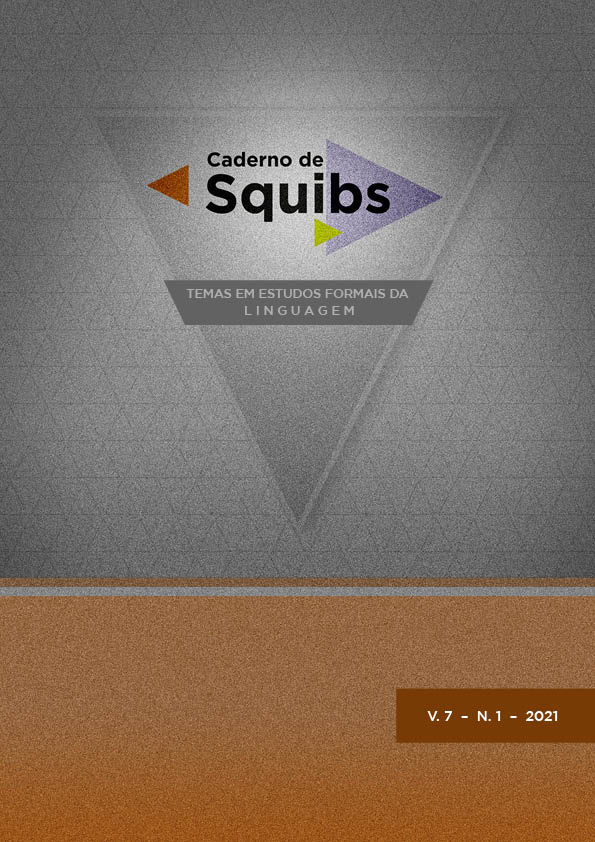The POSSIBLE INFLUENCE OF BRAZILIAN PORTUGUESE (L1) ON THE REALIZATION OF NULL DEFINITE SUBJECTS IN ENGLISH (L2)
Keywords:
Parâmetro do Sujeito Nulo, sujeitos de referência definida, aquisição de segunda língua (SLA), inglês como segunda língua (ESL), bilinguismoAbstract
The aim of the present analysis is to discuss the possible influence of bilinguals’ first language (L1) on their second language (L2) performance. We investigated if undergraduate students of Portuguese-English from Rio de Janeiro would accept definite null subjects in English, which is a possibility in Brazilian Portuguese (PB), but not in English. We selected the syntactic patterns and the semantic features which still favor or disfavor the null subject realization in PB in order to examine if and how the behavior of the L1 could be reflected on the L2 via a grammatical judgment test. We expected that in the structural contexts in which PB shows a higher percentage of null subjects, our participants would have more difficulty to identify missing subjects in English and, in structural contexts in which PB exhibits high percentages of overt subject pronouns, our participants would realize the absence of pronouns more easily. The analysis of our data supports, partially, our previous hypothesis. We finish our study acknowledging that the bilingual experience is dynamic and that both languages are in constant interaction in a bilingual’s mind.
Downloads
References
CHOMSKY, N. Lectures on Government and Binding. Dordrecht: Foris, 1981.
CHOMSKY, N. The minimalist program. Cambridge, MA: The MIT Press, 1995.
COOK, V. J. The poverty-of-the-stimulus argument and multi-competence. Second Language Research, v. 7, n. 2, p. 103-17, 1991.
CUMMINS, J. Linguistic interdependence and the educational development of bilingual children. Review of Educational Research, v. 49, n. 2, p. 222-251, 1979.
CURY, L. S. O Parâmetro do Sujeito Nulo e a Aquisição de Inglês como Segunda Língua. 2020. Monografia (Licenciatura em Letras: Português-Inglês) – Faculdade de Letras, Universidade Federal do Rio de Janeiro. Rio de Janeiro, f. 65. 2020. Disponível em: <http://hdl.handle.net/11422/8790>. Acesso em: 30 nov. 2021.
DUARTE, M. E. L. A perda do princípio “Evite Pronome” no português brasileiro. 1995. Tese (Doutorado em Linguística) – Instituto de Estudos da Linguagem, Universidade Estadual de Campinas, Campinas, f. 151. 1995. Disponível em: <https://bdtd.ibict.br/vufind/Record/CAMP_5341178a9066670986fe9321e2456c59>. Acesso em: 30 nov. 2021.
DUARTE, M. E. L. O sujeito nulo referencial no português brasileiro e no português europeu. In: ROBERTS, I.; KATO, M. A.; GALVES, C. (org.) Português brasileiro: uma segunda viagem diacrônica. Campinas: Editora da Unicamp, 2019. p. 93-126.
GARCÍA, O. Bilingual education in the XXI century: A global perspective. Oxford: Wiley-Blackwell, 2009.
GROSJEAN, F. Neurolinguists, beware! The bilingual is not two monolinguals in one person. Brain and Language, v. 36, n. 1, p. 3-15, 1989.
KENEDY, E.; OTHERO, G. Duas abordagens no estudo da sintaxe. In: KENEDY, E; OTHERO, G. (org.). Para Conhecer Sintaxe. São Paulo: Contexto, 2018. p. 133-173.
LARDIERE, D. Some thoughts on the contrastive analysis of features in second language acquisition. Second Language Research, v. 25, n. 2, p. 173-227, 2009.
MATLAB. Versão 7.10.0 (R2010a). Natick, MA: The MathWorks Inc. Disponível em: https://www.mathworks.com/products/matlab.html. Acesso em: 30 nov. 2021.
MINITAB. Versão Meet Minitab 20 (2019). State College, PA: Minitab Inc. Disponível em: <https://www.minitab.com/en-us/>. Acesso em: 30 nov. 2021.
RIZZI, L. Issues in Italian syntax. Dordrecht: Foris, 1982.
ROBERTS, I.; HOLMBERG, A. Introduction: parameters in minimalist theory. In: BIBERAUER, T.; HOLBERG, A; ROBERTS, I.; SHEEHAN, M. Parametric Variation: Null Subjects in Minimalist Theory. Cambridge: Cambridge University Press, 2010. p. 1-57.
SELINKER, L. Interlanguage. International Review of Applied Linguistics. v. 10, n. 3, p. 209-231, 1972.
SMEETS, L. Conditions on L1 transfer in L2 discourse-syntax mappings: The case of Clitic Left Dislocation in Italian and Romanian. Tese (Doutorado em Filosofia) – Department of Linguistics, McGill University, Montreal, f. 197. 2019. Disponível em: <https://escholarship.mcgill.ca/concern/theses/8049g926b>. Acesso em: 30 nov. 2021.
WHITE, L. The pro-drop parameter in adult second language acquisition. Language Learning. v. 35, n. 1, p. 47-62, 1985.
WHITE, L. Research Timeline: Universal Grammar, crosslinguistic variation and second language acquisition. Language Teaching, v. 45, n. 3, p. 309-328, 2012.
Downloads
Published
Issue
Section
License
Copyright (c) 2022 Caderno de Squibs: Temas em estudos formais da linguagem

This work is licensed under a Creative Commons Attribution-NonCommercial 4.0 International License.
Autorizo a publicação de squib/artigo de minha autoria e inteira responsabilidade para publicação.
I authorize the publication of the squib/paper of my authorship and full responsibility for publication.


